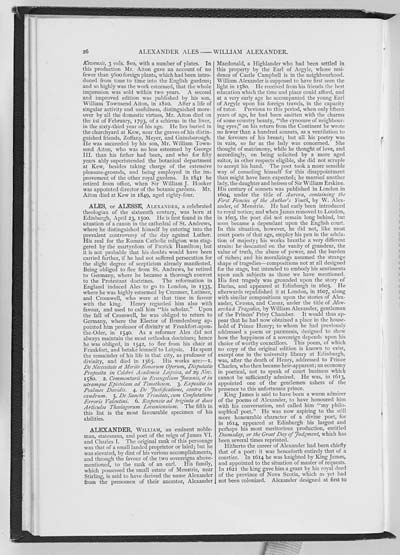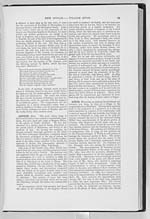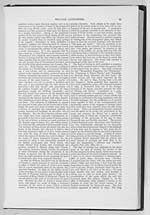Volume 1 > Half-Volume 1
(42) Page 26 - Ales, or Alesse, Alexander
Download files
Individual page:
Thumbnail gallery: Grid view | List view

26 Kewensis, 3 vols. 8vo, with a number of plates. In this production Mr. Aiton gave an account of no fewer than 5600 foreign plants, which had been intro- duced from time to time into the English gardens; and so highly was the work esteemed, that the whole impression was sold within two years. A second and improved edition was published by his son, William Townsend Aiton, in 1810. After a life of singular activity and usefulness, distinguished more- over by all the domestic virtues, Mr. Aiton died on the 1st of February, 1793, of a schirrus in the liver, in the sixty-third year of his age. He lies buried in the churchyard at Kew, near the graves of his distin- guished friends, Zoffany, Meyer, and Gainsborough. He was succeeded by his son, Mr. William Town- send Aiton, who was no less esteemed by George III. than his father had been, and who for fifty years ably superintended the botanical department at Kew, besides taking charge of the extensive pleasure-grounds, and being employed in the im- provement of the other royal gardens. In 1841 he retired from office, when Sir William J. Hooker was appointed director of the botanic gardens. Mr. Aiton died at Kew in 1849, aged eighty-four. ALES, or ALESSE, ALEXANDER, a celebrated theologian of the sixteenth century, was born at Edinburgh, April 23, 1500. He is first found in the situation of a canon in the cathedral of St. Andrews, where he distinguished himself by entering into the prevalent controversy of the day against Luther. His zeal for the Roman Catholic religion was stag- gered by the martyrdom of Patrick Hamilton; but it is not probable that his doubts would have been carried further, if he had not suffered persecution for the slight degree of scepticism already manifested. Being obliged to flee from St. Andrews, he retired to Germany, where he became a thorough convert to the Protestant doctrines. The reformation in England induced Ales to go to London, in 1535, where he was highly esteemed by Cranmer, Latimer, and Cromwell, who were at that time in favour with the king. Henry regarded him also with favour, and used to call him "his scholar." Upon the fall of Cromwell, he was obliged to return to Germany, where the Elector of Brandenburg ap- pointed him professor of divinity at Frankfort-upon- the-Oder, in 1540. As a reformer Ales did not always maintain the most orthodox doctrines; hence he was obliged, in 1542, to flee from his chair at Frankfort, and betake himself to Leipsic. He spent the remainder of his life in that city, as professor of divinity, and died in 1565. His works are:�I. De Necessitate et Merita Bonorum Operum, Dispiitatio Proposita in Celebri Academia Leipsica, ad 29 Nov. 1580. 2. Commentarii in Evangeliiim Joannis, et in utramque Epistolam ad Timotheum. 3. Expositio in Psalmos Davidis. 4. De Justificatione, contra Os- candrum. 5. De Sancta Trinitate, cum Confutatione Erroris Valentini. 6. Responsio ad triginta et duos Articulos Theologorum Lovaniensium. The fifth in this list is the most favourable specimen of his abilities. ALEXANDER, WILLIAM, an eminent noble- man, statesman, and poet of the reign of James VI. and Charles I. The original rank of this personage was that of a small landed proprietor or laird; but he was elevated, by dint of his various accomplishments, and through the favour of the two sovereigns above- mentioned, to the rank of an earl. His family, which possessed the small estate of Menstrie, near Stirling, is said to have derived the name Alexander from the prenomen of their ancestor, Alexander Macdonald, a Highlander who had been settled in this property by the Earl of Argyle, whose resi- dence of Castle Campbell is in the neighbourhood. William Alexander is supposed to have first seen the light in 1580. He received from his friends the best education which the time and place could afford, and at a very early age he accompanied the young Earl of Argyle upon his foreign travels, in the capacity of tutor. Previous to this period, when only fifteen years of age, he had been smitten with the charms of some country beauty, "the cynosure of neighbour- ing eyes;" on his return from the Continent he wrote no fewer than a hundred sonnets, as a ventilation to the fervours of his breast; but all his poetry was in vain, so far as the lady was concerned. She thought of matrimony, while he thought of love, and accordingly, on being solicited by a more aged suitor, in other respects eligible, she did not scruple to accept his hand. The poet took a more sensible way of consoling himself for this disappointment than might have been expected; he married another lady, the daughter and heiress of Sir William Erskine. His century of sonnets was published in London in 1604, under the title of Aurora, containing the First Fancies of the Atithor's Youth, by W. Alex- ander, of Menstrie. He had early been introduced to royal notice; and when James removed to London, in 1603, the poet did not remain long behind, but soon became a dependant upon the English court. In this situation, however, he did not, like most court poets of that age, employ his pen in the adula- tion of majesty; his works breathe a very different strain: he descanted on the vanity of grandeur, the value of truth, the abuse of power, and the burden of riches; and his moralizings assumed the strange shape of tragedies�compositions not at all designed for the stage, but intended to embody his sentiments upon such subjects as those we have mentioned. His first tragedy was grounded upon the story of Darius, and appeared at Edinburgh in 1603. He afterwards republished it at London, in 1607, along with similar compositions upon the stories of Alex- ander, Croesus, and Csesar, under the title of Man- archick Tragedies, by William Alexander, gentleman of the Princes' Privy Chamber. It would thus ap- pear that he had now obtained a place in the house- hold of Prince Henry; to whom he had previously addressed a poem or parsenesis, designed to show how the happiness of a sovereign depends upon his choice of worthy councillors. This poem, of which no copy of the original edition is known to exist, except one in the university library at Edinburgh, was, after the death of Henry, addressed to Prince Charles, who then became heir-apparent; an economy in poetical, not to speak of court business which cannot be sufficiently admired. He was, in 1613, appointed one of the gentlemen ushers of the presence to this unfortunate prince. King James is said to have been a warm admirer of the poems of Alexander, to have honoured him with his conversation, and called him "my philo- sophical poet." He was now aspiring to the still more honourable character of a divine poet, for in 1614, appeared at Edinburgh his largest and perhaps his most meritorious production, entitled Doomsday, or the Great Day of Judgment, which has been several times reprinted. Hitherto the career of Alexander had been chiefly that of a poet: it was henceforth entirely that of a courtier. In 1614 he was knighted by King James, and appointed to the situation of master of requests. In 1621 the king gave him a grant by his royal deed of the province of Nova Scotia, which as yet had not been colonized. Alexander designed at first to
Set display mode to:
![]() Universal Viewer |
Universal Viewer | ![]() Mirador |
Large image | Transcription
Mirador |
Large image | Transcription
Images and transcriptions on this page, including medium image downloads, may be used under the Creative Commons Attribution 4.0 International Licence unless otherwise stated. ![]()
| Biographical dictionary of eminent Scotsmen > Volume 1 > Half-Volume 1 > (42) Page 26 - Ales, or Alesse, Alexander |
|---|
| Description | Spine title: Half-Vol. I. Abercromby to Campbell. |
|---|---|
| Description | Volume I. Contains names alphabetically from Abercromby to Erskine. |
|---|

